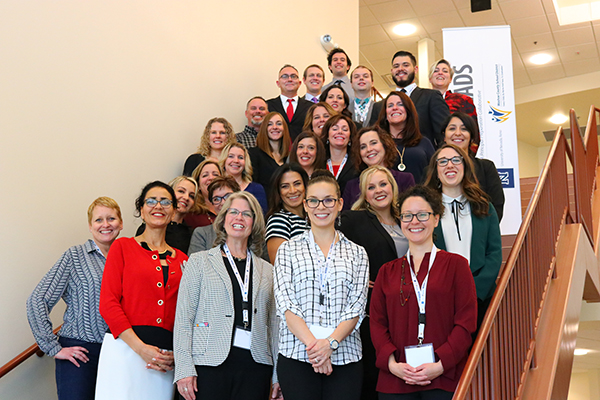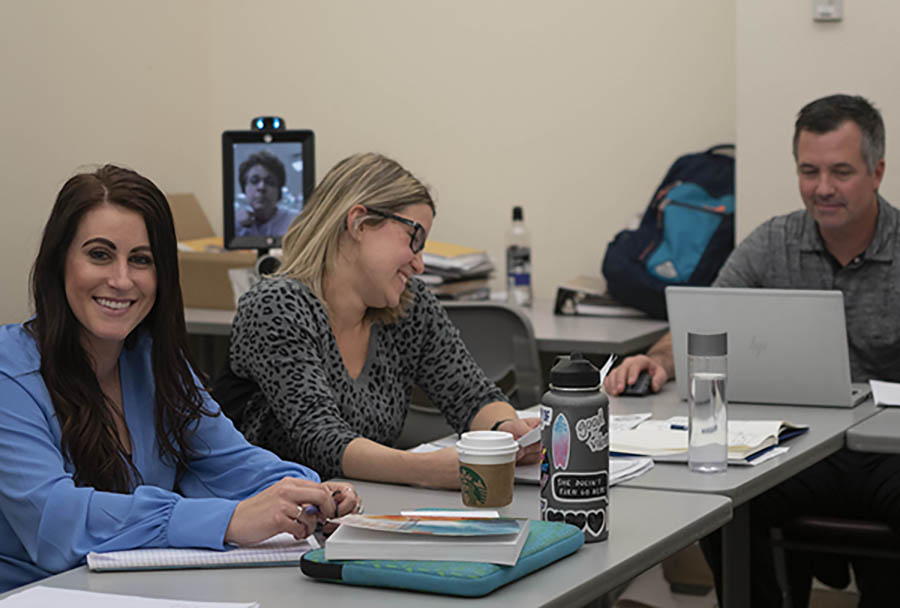Three years ago, the University of Nevada, Reno’s College of Education, with the help of the Washoe County School District, completely reworked its Master of Education in Educational Leadership program. Nevada Leads, a principal preparation collaborative, was the product of an innovative, University-district partnership created to support exceptional Washoe County School District teachers for educational leadership positions.
Since the program’s inception in 2016, the first cohort of 25 students has graduated with most of the teachers in the program moving on to the district’s academy of school leaders, and many are already serving as deans in the Washoe County School District.
“While these educators still need to work their way through the leadership pipeline, we’re thrilled to see graduates of our first cohort accept leadership positions within the district,” Jafeth Sanchez, assistant professor of educational leadership at the University, said.

Nevada Leads graduated its first cohort in 2018.
Program transformation
After the first year of the program, Nevada Leads added five educators from the Carson City School District, all with principal mentors within that district. That second cohort of 20 teachers, and the third cohort of 12 teachers, each have mentor principals within their district. Additionally, these principals also co-teach each of the courses offered within the program.
“Having educational leaders from within the school districts helps inform the curriculum and has been an important step forward for the program,” Sanchez said. “Our core sequence addresses issues principals face and often aligns with what principals themselves are working on throughout the year.”
According to Sanchez, while co-teaching is not uncommon at the undergraduate level, it is fairly uncommon to have a graduate program where each class offers a co-teaching format.
“When the principal at my school told me about Nevada Leads and suggested I apply, I jumped at the chance, mainly because of the unique opportunity if afforded,” Jennifer Lienau, the International Baccalaureate Diploma program coordinator at Earl Wooster High School, said. “I really enjoy the co-teaching model that is used. One thing I always disliked about education classes was feeling like I was being taught by people who had never taught outside of a university. The Nevada Leads’ classes are theoretical and practical, thanks to the co-teaching model. I also appreciate that our internship is not just the last semester of a two-year program, but an ongoing course throughout the two years. The program has been thoughtfully and intentionally created so that each class works off a previous class, and they all blend seamlessly together.”
Students in the program participate in what Sanchez refers to as the flipped hybrid model. They receive much of the content online before coming to class and then are given the opportunity to discuss what they are learning in the classroom. While each educator is matched with a mentor principal for the full two years of the program, the program takes extra care to ensure graduate students are placed at a school level different than their current education focus (i.e., elementary v. secondary), increasing their ability to become a highly qualified school leader.
The program is funded through Nevada’s Great Teaching and Leading Fund for $468,000 over two years, with the first grant funded for $127,000.
“The Nevada Leads collaborative is important to the Washoe County School District because it has improved aspiring principal preparation,” Salwa Zaki, Washoe County School District director of the Department of Professional Learning, said. “The most exciting aspect of Nevada Leads has been to consistently receive positive feedback from graduates – and district leaders interviewing and interacting with graduates – about how well-prepared they are to take the next step in the educational leadership journey.”
Nevada Leads into the future

Nevada Leads students in the classroom including Tiffany Williams on the telepresence robot.
In order for the program to extend across the state, Nevada Leads recently entered into a partnership with Double Robotics. With the use of telepresence robots, remote students are now able to log on to their computer and have a physical presence in the classroom through the robot, which University faculty can move and control to enhance classroom participation. This technology has enabled Tiffany Williams, a teacher at Spring Creek High School in Spring Creek, Nevada, to participate in the Nevada Leads program.
“Had it not been for this robot, I would not have been able to participate in this program,” Williams said. “The technology is relatively straightforward and not difficult to use. That said, the Nevada Leads program itself is challenging but I am in a good group of peers and that makes all the difference.”
The telepresence robot is funded through the program’s grant and, should more rural educators become interested in the program, it offers an important opportunity for growth.
“As this program continues to grow, it is our hope to partner with school districts across Nevada and educate teachers, regardless of their location,” Sanchez said.












